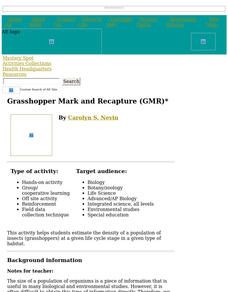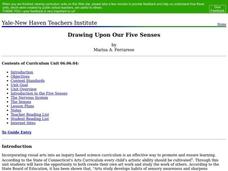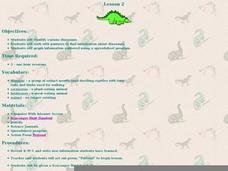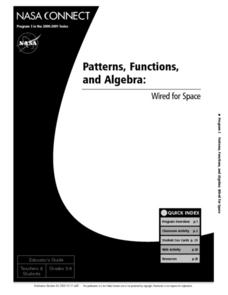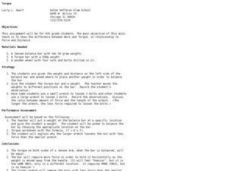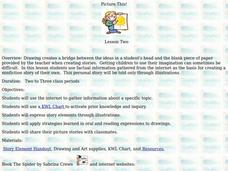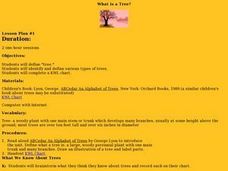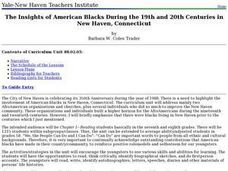Curated OER
Enemies and Threats to Sea Horses
Students research threats and enemies of the sea horse. In this animal biology lesson, students use the Internet to find threats and enemies of sea horses and write a paragraph on their findings.
Curated OER
The Rise of Christianity in the Roman Empire
Ninth graders investigate the growth of Christianity in Rome. In this Roman Empire lesson, 9th graders listen to a SMART Board lecture about the Jesus, Christianity, and the empire prior to composing thematic essays about the spread of...
Curated OER
Grasshopper Mark and Recapture (GMR)
Learners estimate the density of a population of insects (grasshoppers) at a given life cycle stage in a given type of habitat.
Curated OER
Drawing Upon Our Five Senses
Students observe and create artistic representations, technological images, and scientific diagrams. They explore the five senses, the structure and function of the corresponding organs, and how the senses are connected to the human brain.
Curated OER
Dinosaur Scavenger Hunt
Students conduct research on dinosaurs and graph the information gathered using a spreadsheet program. In pairs they complete an Internet scavenger hunt, and record five facts about dinosaurs in their science journal.
Curated OER
Patterns, Functions, and Algebra: Wired for Space
Students assess how patterns, functions and algebra can assist NASA engineers design new ways of propelling spacecrafts. They explore how electricity and magnetism are replacing the fuel-consuming rocket propulsion. Electromagnetism is...
Curated OER
Autism – What Is It?
Students create a poster about expected development versus observed behavior of a child with autism. In this health lesson, students describe the signs of ASD. They read and analyze a simulated case study.
Curated OER
Under Electronic Lock and Key
Students evaluate issues of privacy and security by discussing whether or not one must compromise privacy to better ensure security and vice versa.
Curated OER
200 Greatest Pop Culture Icons
Learners discuss the style and characteristics of the Classical era and the genre of opera. They compare and contrast modern day popular icons to musical icons throughout history. They write original librettos to modern entertainment.
Curated OER
The Effects of Pesticides on the Food Chain
Fourth graders generalize that all animals, including people, depend on plants as a food source. In this science lesson plan, 4th graders describe and construct a food chain, tell how pesticides enter the food chain, and discuss possible...
Curated OER
How are torque and work different?
Sixth graders explore how torque and work are different. In this torque lesson plan, 6th graders will understand the relationship between torque and work as it applies to force and distance. Students will be assessed on their conclusions...
Curated OER
No Regrets: a Poetry Analysis
Young scholars read a poem and use the TPCASTT strategy for analysis. In this poetry analysis lesson, students journal about their future goals and read John Updike's "Ex-Basketball Player." Young scholars discuss the purpose of the poem...
Curated OER
Picture This
Students explore finding facts from the Internet to create a nonfiction story. In this writing activity, students fill out KWL charts and do internet research about the given topic of spiders. Students then create and illustrate their...
Curated OER
Sea Horse Body Parts
Students complete a diagram of sea horse body parts. For this sea horse lesson, students review the story Sea Horses A True Book, complete a sea horse diagram using Internet sights to help, make new entries in their KWL charts and work...
Curated OER
What is a Tree?
Students identify and define types of trees. In this tree identification lesson plan, students complete a KWL chart on trees and read the book ABCedar: An Alphabet of Trees. Students complete a tree word scramble.
Curated OER
Insect Conservation
Students make a diorama. In this insect lesson plan, students review what they know and what they need to know about insects. Students define conservation, discuss why it is important to conserve insects, and make an insect diorama.
Curated OER
Understanding a Legislator
Using a videoptaped segment of a Connecticut legilative session, students role-play designated legislators, researching positions, and making presentations. They compare their class votes with the actual outcome.
Curated OER
1st Grade - Act. 09: Freedom Quilt
First graders create sections of classroom quilt that be tied together.
Curated OER
Riding the Pony Express
Fourth graders list the four W's of the Pony Express. They also write an article about Buffalo Bill Cody and discuss the important facts about the Pony Express.
Curated OER
Toting the Log and Lifting the Babe
Students use simple machines that demonstrate force, friction, work and power. They investigate and explain simple machines.
Curated OER
Deserts
Students do various activities to explain where the United States' desert region lies in relationship to the state in which they live, become familiar with plants and animals in the Sonoran desert, and make a story map of Roadrunner...
Curated OER
Statistical Drug Abuse and Adolescents in the U.S.A.
Learners examine statistics of teenagers using alcohol and marijuana. In groups, they brainstorm the reasons why they believe usage is higher than in years past. As a class, they role-play different roles in scenerios to help them...
Curated OER
Highlights of Modern American Family Art and Literature
Students develop imagery in literary and art works. They discuss Jacob Lawrence's painting, the "Tombstones, 1942", which conveyed overcrowded tenements and families living in Harlem (New York, New York). They design picture stories...
Curated OER
The Insights of American Blacks During the 19th and 20th Centuries in New Haven, Connecticut
Students examine the contributions of African Americans in New Haven, Connecticut in the 19th and 20th centuries. After being introduced to new vocabulary, they review the elements of autobiographies and read excerpts of African...




